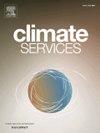气候情景分析中的企业竞争:当前的挑战和解决方案
IF 4.5
3区 环境科学与生态学
Q2 ENVIRONMENTAL SCIENCES
引用次数: 0
摘要
气候相关财务披露工作组(TCFD)和国际财务报告准则(IFRS) S2气候相关披露联盟最近成为企业披露气候相关风险的主要推动力。在这种背景下,气候情景分析对未来定量气候风险有直接影响,因此在气候相关风险披露的技术方面起着关键作用。为有效顺应全球气候风险披露趋势,台湾主管部门现鼓励各大企业积极配合TCFD及IFRS S2。然而,许多公司陷入了“气候情景分析竞争”的神话,导致各大公司竞相在其报告中展示各种情景分析结果。在相互学习的过程中,他们往往忽略了自己的需求,回避了关键问题,遗漏了真正重要的信息。本研究以气候服务产业链为分析框架,开展利益相关者访谈,探讨企业在准确披露气候风险和进行情景分析方面面临的困难,并考察公共气候服务提供者所扮演的角色。研究结果表明,不同行业的情景分析标准操作程序(SOP)、气候情景的定制化生产和分析以及公共和私营气候服务提供商的培养,都是克服当前企业气候情景分析面临的挑战所不可或缺的。本文章由计算机程序翻译,如有差异,请以英文原文为准。
Corporate competition in climate scenario analysis: Current challenges and solutions
The Task Force on Climate-related Financial Disclosures (TCFD) and IFRS (International Financial Reporting Standards) S2 Climate-related Disclosures alignments have recently emerged as a main driving force for companies to disclose climate-related risks. In this context, climate scenario analysis has a direct impact on future quantitative climate risks, and therefore plays a pivotal role in the technical aspects of climate-related risk disclosures. To effectively comply with world trend in climate risk disclosures, competent authorities in Taiwan now encourage major companies to actively align with the TCFD and IFRS S2. However, many firms fell into the myth of the “climate scenario analysis competition”, leading major companies to compete to display various scenario analysis results in their reports. While learning from each other, they tend to lose sight of their own needs, avoiding crucial issues and omitting the truly important information. This study uses the industry chain of climate services as an analytical framework to conduct stakeholder interviews to explore the difficulties companies face in accurately disclosing their climate risks and in conducting scenario analysis, and also examine the role played by public climate service providers. The research results show that standard operating procedures (SOP) for scenario analysis in different industries, customized climate scenario production and analysis, and the cultivation of public and private climate service providers are all indispensable for overcoming challenges currently facing effective corporate climate scenario analysis.
求助全文
通过发布文献求助,成功后即可免费获取论文全文。
去求助
来源期刊

Climate Services
Multiple-
CiteScore
5.30
自引率
15.60%
发文量
62
期刊介绍:
The journal Climate Services publishes research with a focus on science-based and user-specific climate information underpinning climate services, ultimately to assist society to adapt to climate change. Climate Services brings science and practice closer together. The journal addresses both researchers in the field of climate service research, and stakeholders and practitioners interested in or already applying climate services. It serves as a means of communication, dialogue and exchange between researchers and stakeholders. Climate services pioneers novel research areas that directly refer to how climate information can be applied in methodologies and tools for adaptation to climate change. It publishes best practice examples, case studies as well as theories, methods and data analysis with a clear connection to climate services. The focus of the published work is often multi-disciplinary, case-specific, tailored to specific sectors and strongly application-oriented. To offer a suitable outlet for such studies, Climate Services journal introduced a new section in the research article type. The research article contains a classical scientific part as well as a section with easily understandable practical implications for policy makers and practitioners. The journal''s focus is on the use and usability of climate information for adaptation purposes underpinning climate services.
 求助内容:
求助内容: 应助结果提醒方式:
应助结果提醒方式:


